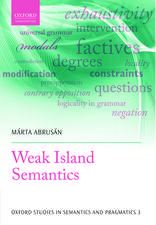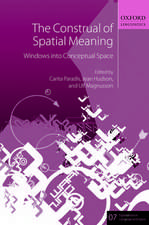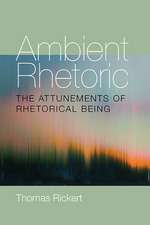Rhetoric in American Anthropology: Gender, Genre, and Science: Composition, Literacy, and Culture
Autor Risa Applegarthen Limba Engleză Paperback – 30 mai 2014
In the early twentieth century, the field of anthropology transformed itself from the “welcoming science,” uniquely open to women, people of color, and amateurs, into a professional science of culture. The new field grew in rigor and prestige but excluded practitioners and methods that no longer fit a narrow standard of scientific legitimacy. In Rhetoric in American Anthropology, Risa Applegarth traces the “rhetorical archeology” of this transformation in the writings of early women anthropologists. Applegarth examines the crucial role of ethnographic genres in determining scientific status and recovers the work of marginalized anthropologists who developed alternative forms of scientific writing.
Applegarth analyzes scores of ethnographic monographs to demonstrate how early anthropologists intensified the constraints of genre to define their community and limit the aims and methods of their science. But in the 1920s and 1930s, professional researchers sidelined by the academy persisted in challenging the field’s boundaries, developing unique rhetorical practices and experimenting with alternative genres that in turn greatly expanded the epistemology of the field. Applegarth demonstrates how these writers’ folklore collections, ethnographic novels, and autobiographies of fieldwork experiences reopened debates over how scientific knowledge was made: through what human relationships, by what bodies, and for what ends. Linking early anthropologists’ ethnographic strategies to contemporary theories of rhetoric and composition, Rhetoric in American Anthropology provides a fascinating account of the emergence of a new discipline and reveals powerful intersections among gender, genre, and science.
Applegarth analyzes scores of ethnographic monographs to demonstrate how early anthropologists intensified the constraints of genre to define their community and limit the aims and methods of their science. But in the 1920s and 1930s, professional researchers sidelined by the academy persisted in challenging the field’s boundaries, developing unique rhetorical practices and experimenting with alternative genres that in turn greatly expanded the epistemology of the field. Applegarth demonstrates how these writers’ folklore collections, ethnographic novels, and autobiographies of fieldwork experiences reopened debates over how scientific knowledge was made: through what human relationships, by what bodies, and for what ends. Linking early anthropologists’ ethnographic strategies to contemporary theories of rhetoric and composition, Rhetoric in American Anthropology provides a fascinating account of the emergence of a new discipline and reveals powerful intersections among gender, genre, and science.
Din seria Composition, Literacy, and Culture
-
 Preț: 426.79 lei
Preț: 426.79 lei -
 Preț: 430.66 lei
Preț: 430.66 lei -
 Preț: 426.79 lei
Preț: 426.79 lei -
 Preț: 390.71 lei
Preț: 390.71 lei -
 Preț: 388.79 lei
Preț: 388.79 lei -
 Preț: 139.00 lei
Preț: 139.00 lei -
 Preț: 425.86 lei
Preț: 425.86 lei -
 Preț: 388.79 lei
Preț: 388.79 lei -
 Preț: 388.79 lei
Preț: 388.79 lei -
 Preț: 348.83 lei
Preț: 348.83 lei -
 Preț: 210.43 lei
Preț: 210.43 lei -
 Preț: 199.10 lei
Preț: 199.10 lei -
 Preț: 181.71 lei
Preț: 181.71 lei -
 Preț: 422.97 lei
Preț: 422.97 lei -
 Preț: 388.79 lei
Preț: 388.79 lei -
 Preț: 394.57 lei
Preț: 394.57 lei -
 Preț: 386.88 lei
Preț: 386.88 lei -
 Preț: 362.33 lei
Preț: 362.33 lei -
 Preț: 446.05 lei
Preț: 446.05 lei -
 Preț: 390.71 lei
Preț: 390.71 lei -
 Preț: 391.67 lei
Preț: 391.67 lei -
 Preț: 383.01 lei
Preț: 383.01 lei -
 Preț: 358.46 lei
Preț: 358.46 lei -
 Preț: 197.45 lei
Preț: 197.45 lei -
 Preț: 388.79 lei
Preț: 388.79 lei -
 Preț: 359.07 lei
Preț: 359.07 lei -
 Preț: 349.99 lei
Preț: 349.99 lei -
 Preț: 356.55 lei
Preț: 356.55 lei -
 Preț: 387.82 lei
Preț: 387.82 lei -
 Preț: 360.37 lei
Preț: 360.37 lei -
 Preț: 392.66 lei
Preț: 392.66 lei -
 Preț: 425.86 lei
Preț: 425.86 lei -
 Preț: 424.88 lei
Preț: 424.88 lei -
 Preț: 391.67 lei
Preț: 391.67 lei -
 Preț: 386.88 lei
Preț: 386.88 lei -
 Preț: 348.83 lei
Preț: 348.83 lei -
 Preț: 386.88 lei
Preț: 386.88 lei -
 Preț: 385.91 lei
Preț: 385.91 lei -
 Preț: 384.92 lei
Preț: 384.92 lei -
 Preț: 385.91 lei
Preț: 385.91 lei -
 Preț: 384.00 lei
Preț: 384.00 lei -
 Preț: 426.79 lei
Preț: 426.79 lei -
 Preț: 426.79 lei
Preț: 426.79 lei -
 Preț: 350.79 lei
Preț: 350.79 lei -
 Preț: 386.88 lei
Preț: 386.88 lei -
 Preț: 350.79 lei
Preț: 350.79 lei -
 Preț: 383.01 lei
Preț: 383.01 lei -
 Preț: 350.79 lei
Preț: 350.79 lei -
 Preț: 385.91 lei
Preț: 385.91 lei
Preț: 389.38 lei
Nou
Puncte Express: 584
Preț estimativ în valută:
74.51€ • 77.79$ • 61.66£
74.51€ • 77.79$ • 61.66£
Carte tipărită la comandă
Livrare economică 04-18 aprilie
Preluare comenzi: 021 569.72.76
Specificații
ISBN-13: 9780822962953
ISBN-10: 0822962950
Pagini: 280
Dimensiuni: 152 x 229 x 20 mm
Greutate: 0.45 kg
Ediția:1
Editura: University of Pittsburgh Press
Colecția University of Pittsburgh Press
Seria Composition, Literacy, and Culture
ISBN-10: 0822962950
Pagini: 280
Dimensiuni: 152 x 229 x 20 mm
Greutate: 0.45 kg
Ediția:1
Editura: University of Pittsburgh Press
Colecția University of Pittsburgh Press
Seria Composition, Literacy, and Culture
Recenzii
"Meticulously researched, theoretically savvy, and elegantly written in crisp prose, Applegarth's Rhetoric in American Anthropology is an invaluable resource for scholars in rhetoric of science, rhetorical genre studies, women's rhetoric, Native studies, historiography and methodology, and American studies."
—Rhetoric and Public Affairs
“Applegarth’s provocative account of genre formation challenges our understanding of genre, professionalization and scientific discipline formation. Scholars of anthropology, scientific rhetoric, and gender and race studies will value Applegarth’s recovery of three powerful early genres and the writers who produced them.”
—Brent Henze, East Carolina University
—Brent Henze, East Carolina University
Risa Applegarth’s Rhetoric in American Anthropology draws our attention to the work—both past and present—of defining what counts as anthropological fieldwork, as well as who is allowed to do this work. Using a novel approach to rhetorical archeology, she explains how different concepts of ‘the field’ and forms of writing arose historically, and most importantly, how women and scholars of color have been both marginalized and influential in these developments.”
—Rogers P. Hall, Vanderbilt University
—Rogers P. Hall, Vanderbilt University
Notă biografică
Risa Applegarth is assistant professor of English at the University of North Carolina at Greensboro. She is the recipient of numerous grants and awards, including the James Berlin Memorial Outstanding Dissertation Award from the Conference on College Composition and Communication.
Descriere
In the early twentieth century, the field of anthropology transformed itself from the “welcoming science,” uniquely open to women, people of color, and amateurs, into a professional science of culture. The new field grew in rigor and prestige but excluded practitioners and methods that no longer fit a narrow standard of scientific legitimacy. In Rhetoric in American Anthropology, Risa Applegarth traces the “rhetorical archeology” of this transformation in the writings of early women anthropologists.


















